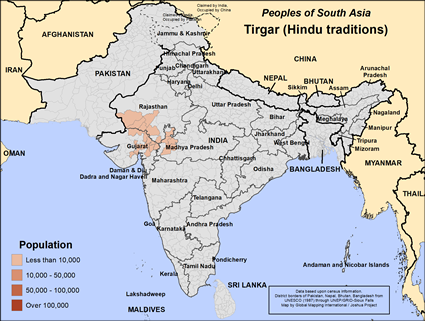Tirgar (Hindu traditions) in India

Photo Source:
Anonymous
|

Map Source:
People Group data: Omid. Map geography: UNESCO / GMI. Map Design: Joshua Project
|
| People Name: | Tirgar (Hindu traditions) |
| Country: | India |
| 10/40 Window: | Yes |
| Population: | 15,000 |
| World Population: | 15,000 |
| Primary Language: | Gujarati |
| Primary Religion: | Hinduism |
| Christian Adherents: | 0.00 % |
| Evangelicals: | 0.00 % |
| Scripture: | Complete Bible |
| Ministry Resources: | Yes |
| Jesus Film: | Yes |
| Audio Recordings: | Yes |
| People Cluster: | South Asia Dalit - other |
| Affinity Bloc: | South Asian Peoples |
| Progress Level: |
|
Introduction / History
The Tirgar are a relatively small group of people who live in western India. Their name comes from words "arrow maker." The traditional occupation of the Tirgar was making bows and arrows for the armies of west and north India. Most Tirgar today work as agricultural laborers, often on land owned by higher castes. The Tirgar claim to be descendants of Rajputs or rulers but are seen by others as the lowest of the four castes in the Hindu system.
The main languages of the Tirgar are Gujarati and Hindi. Many Christian resources are available in both of these major languages.
Where Are they Located?
The Hindu Tirgar people are scattered throughout western India, especially in the states of Gujarat, Maharashtra and Rajasthan.
What Are Their Lives Like?
The Tirgar's ancient profession of making bows and arrows has disappeared in the modern age. Most have taken to agriculture. Some Tirgar own the land they work on but most live as landless farm laborers. Illiteracy is a major issue for the Tirgar. Their children, especially the girls, quit school after a few years to help their parents make a living.
The Tirgar marry within their group but outside of their clan or gotra. Families arrange marriages with the consent of the young people. Sons inherit their father's property. A cast council settles legal issues and promotes the Tirgar's interests.
The main foods of the Tirgar are rice, wheat, lentils, vegetables, and dairy products. As Hindus they will not eat beef.
What Are Their Beliefs?
The Tirgar people practice Hinduism mixed with animism. They pay special devotion to the gods Thakurji, Shundamata, Krishna, and Rama. The Tirgar visit Hindu temples and offer prayers, food, flowers, and incense to their gods in hopes of gaining protection and benefits. They do not have a personal or familial relationship with their gods. There are many forms of Hinduism, each with its own deities and beliefs.
The main yearly holidays of the Tirgar people are Holi, the festival of colors and the start of spring, Diwali, the festival of lights, Navratri, the celebration of autumn and Rama Navami, Rama's birthday.
What Are Their Needs?
The Tirgar need to see believers in Christ demonstrating the victorious life in practical ways. They need schools where they children can learn to read and write. Many Tirgar lack access to modern medicine. The Tirgar would benefit by learning new job skills as farm laborers often make only a subsistent wage. Most of all, the Tirgar need to hear and respond to the message of Jesus Christ. He alone can forgive their sins and bring them hope of a better life.
Prayer Points
Pray for the Holy Spirit to give the Tirgar people teachable and understanding hearts.
Pray that a strong movement of the Holy Spirit will bring entire Tirgar families into a rich experience of God's blessing.
Pray for Tirgar families to be drawn by the Holy Spirit to seek forgiveness, and to understand the adequacy of Christ's work on the cross.
Pray for teams of believers to do sustained, focused prayer for the Lord to open the hearts of Tirgar family leaders to experience God's blessing through a movement of family-based discovery Bible studies.